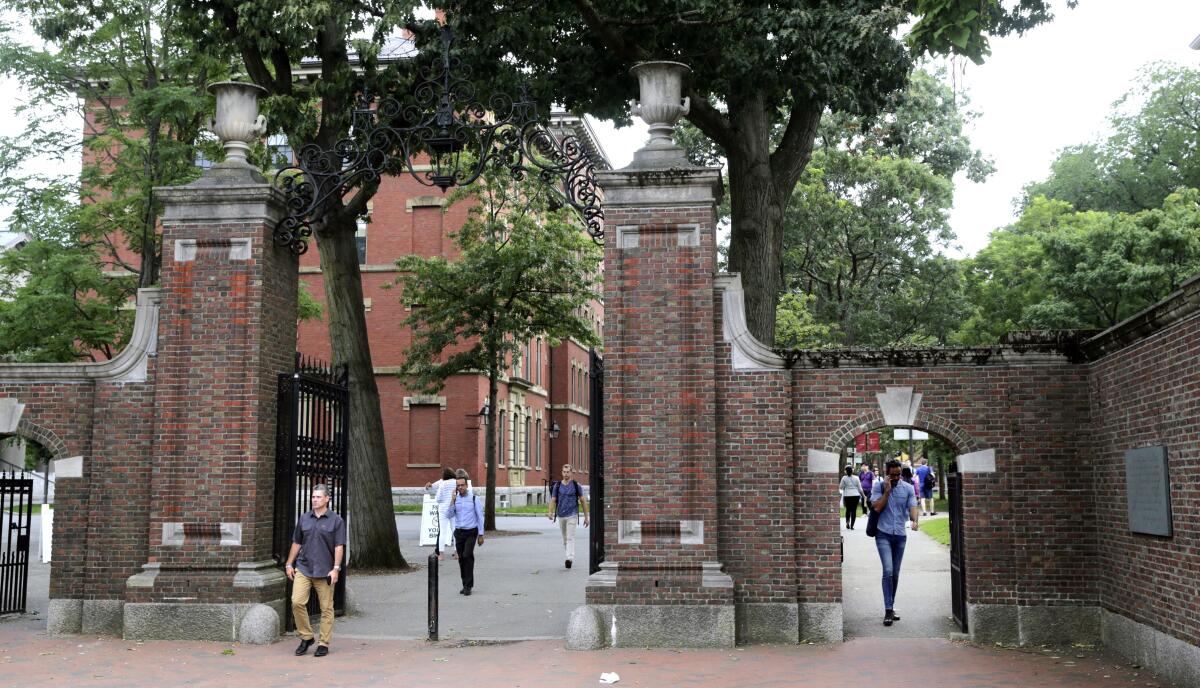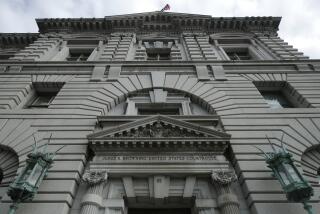Trump administration does about-face, drops rule that threatened foreign students

The Trump administration abruptly reversed course Tuesday, telling a federal judge in Boston that it was dropping a new policy that would have required international students to leave the U.S. if their colleges or universities were offering only online classes.
The announcement was made without explanation in a hearing with U.S. District Judge Allison D. Burroughs, according to court documents, as part of a lawsuit brought by Harvard and the Massachusetts Institute of Technology. The suit challenged a rule issued last week by U.S. Immigration and Customs Enforcement.
The judge said the administration had agreed to “return to the status quo,” in which foreign students could remain in the U.S. while taking classes online during the COVID-19 pandemic.
The administration’s rule would have had a particularly severe effect in California, which hosts the largest number of foreign students in the nation. Last year, 161,693 international students — primarily from China, India, South Korea, Taiwan and Japan — studied in California, according to the Institute of International Education.
California’s three public systems of higher education have also challenged the rule in separate proceedings.
White House officials did not comment on the reversal, and ICE officials did not immediately respond to a request for comment.
The rule, which would have denied visas to students unless their schools were providing in-person classes, could have left thousands of students facing a potentially dangerous choice: either return home or scramble to find courses that had a classroom component. Many universities have pushed all or most of their classes online to avoid spreading the novel coronavirus.
“If you really want me to go, how am I supposed to go? My country is still locked down right now. I can’t leave even if I wanted to. How is that even enforceable?” said Tuzo Mulunda, a Harvard sophomore from Kenya.
She’s been living in a dorm since March. She can’t go back to Kenya because its borders have been closed and are set to tentatively reopen in August.
“Some people live in places where there’s horrible internet connection,” she said. “So the only hope of continuing with online classes was to stay here. And if that’s out the window, then they’re literally being forced to take a year off.”
California Atty. Gen. Xavier Becerra, who filed suit along with Cal State and the California Community Colleges, said “the Trump administration appears to have seen the harm of its July 6 directive, but it shouldn’t take lawsuits and widespread outcry for them to do their job.”
He accused the administration of compromising the health and safety of students.
But Mark Krikorian, a leading immigration hawk with the Center for Immigration Studies, sharply attacked the decision, saying in a tweet that “Sir Donald” had “bravely turned his tail and fled” from the fight.
“It’s not that big an issue. It’s one example of the predominance of the weak-borders faction in the White House,” he said in an interview. “If Harvard wants to educate foreign students online exclusively, why do they need to come here?”
The administration has argued broadly that the United States’ immigration policies are too lax and, in a time of high unemployment, are hurting American job hunters. Evidence largely points to the contrary. And many of those who study here either return home or take jobs that increase economic growth.
Aaron Reichlin-Melnick, policy counsel for the pro-immigrant American Immigration Council, said ICE could try to write a new version of the rule that would apply only to new students, excluding those who are already studying at American universities.
But “they’ve already wasted almost 10 days over this issue, and the fall semester’s coming up very quickly,” said Reichlin-Melnick, whose group is not part of the lawsuit.
The lawsuit was not dismissed Tuesday, meaning Harvard and MIT could return to court if the administration chooses to issue a new rule.
Even with the reversal, however, several factors unrelated to administration policy will probably lower the number of international students coming to U.S. campuses this fall. The United States continues to ban travel from much of Europe and Asia; other nations have restricted travel to the U.S. and some students may decide to stay home, given this country’s role as the leading hot spot in the pandemic.
In addition, U.S. consulates worldwide have been closed for routine visa services since late March and are only beginning to reopen this week.
The numbers are important for many universities, which depend on foreign students, who usually pay full tuition, to subsidize American students and research.
Among California campuses, USC was the No. 1 host for international students, followed by UCLA, UC San Diego, UC Berkeley and UC Irvine.
Last week, the state of California and its three systems of public higher education filed challenges to the ICE order in two separate lawsuits, arguing that the rule was “arbitrary and capricious” in violation of federal regulations and would result in grave harm to their international students, research enterprise, teaching staff and financial stability.
About 37,500 foreign students study at the UC’s 10 campuses.
In a statement, University of California Board of Regents Chair John A. Pérez and President Janet Napolitano called the administration’s reversal “a win for common sense and public health.”
“College and university leaders must be allowed to make decisions about campus operations that are guided by public health experts — not by a hastily drafted, arbitrary and mean-spirited policy,” they said, adding that the university “will be keeping a watchful eye on what the administration might propose next should we need to step in again.”
The 115-campus state community college system hosts 21,754 international students and the 23-campus Cal State system expects about 10,300 students from abroad to enroll this fall.
California Community Colleges Chancellor Eloy Ortiz Oakley said he was pleased by the change in direction — but wary.
“We remain cautious about the intentions of ICE and the Trump administration as it relates to international students and we will continue to pursue further clarification and protections for all of our students,” he said.
Ted Mitchell, president of the American Council on Education, which represents more than 1,700 colleges and universities, hailed the ICE rollback as the “sensible and humane thing to do.”
“It helps ensure that the United States remains the destination of choice for the world’s most talented students and scholars, with all of the benefits that brings,” he said.
Bierman and Wailoo reported from Washington and Watanabe from Los Angeles.
More to Read
Get the L.A. Times Politics newsletter
Deeply reported insights into legislation, politics and policy from Sacramento, Washington and beyond. In your inbox three times per week.
You may occasionally receive promotional content from the Los Angeles Times.








